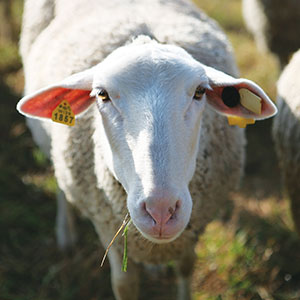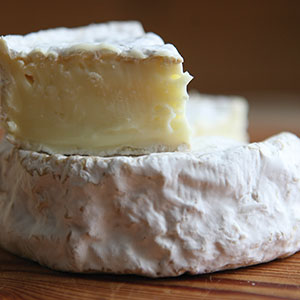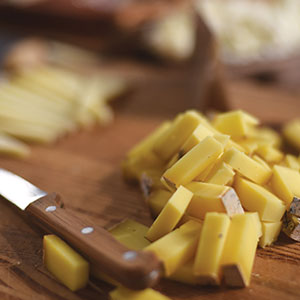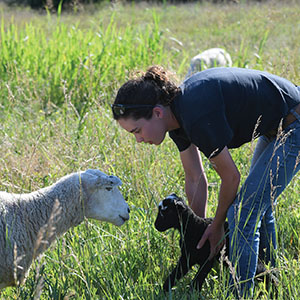In 2002, Sarah Hoffmann was struck with an idea — she would use her family’s Weston, MO-based farmland to make artisanal sheep’s milk as a way to be economically sustainable. The problem was, she didn’t really know how to make cheese, and she didn’t know how to milk sheep.
“I had a lot of learning to do, and I spent the next six years building up our facilities on the farm and learning how to do those things,” she says. “By 2008, I had enough knowledge and courage to invest money in building the infrastructure and go all-in.”

That year, Green Dirt Farm started commercial cheesemaking officially, milking 60 sheep and making 800 pounds of cheese.
Getting into the cheese industry wasn’t just an outlandish idea, as Hoffmann’s education and experience actually made the decision seem very sensible. She went to school for chemistry and medicine, with a concentration on infectious diseases, and believes that chemistry and microbiology are a great marriage for successful cheese making.
She also had an aunt who owned a gourmet cheese shop in New Jersey when she was a teenager. Hoffmann attended college nearby and during breaks and holidays, she would go to the store and help her, which was her first education in artisanal cheese.
“This was in the ’70s, when fine cheese was hard to come by in the U.S.,” she says. “This came together in a serendipitous way as the perfect background for being a cheesemaker.”
On the Right Path
In 2009, Green Dirt Farm upped its first-year total substantially, with 3,000 pounds of cheese produced.
“Things were going really well from a marketing perspective, as we were selling everything we made and didn’t have enough inventory to supply what everyone wanted,” says Hoffmann. “We kept growing, and the next year we made 8,000 pounds of cheese, the year after it was 12,000. But as we grew, we continued experiencing issues around becoming economically sustainable.”
You see, once the company started selling the cheese, Hoffmann realized she made some miscalculations.

“We were doing really well from a marketing and selling point of view, but by 2013 it became really clear that we weren’t making enough to be economically sustainable,” says Hoffmann. “What that spurred was us to reach out to other famers in our region to partner with them to produce sheep milk for us, as well.”
Two years later, the company started exploring bringing in some cow’s milk and began to make blended sheep and cow milk cheeses to add to its offerings.
In 2017, Green Dirt Farm produced 24,000 pounds of cheese and is on track to make and sell 30,000 to 40,000 pounds this year.
Cheese Favorites
Green Dirt Farm makes a wide-range of cheeses with sheep milk partly because Hoffmann wanted to experiment and find what the market niche would be for different varieties. She also sought to give her customers different taste experiences with sheep milk.
For a cheese to be worthy of the company name, she notes it has to be delicious but also interesting on some level.
“One of the things we say to our customers is that we want them to have an adventure with taste,” says Hoffmann. “By giving them a cheese that is unique and distinctive and unusual, we are providing them with what we feel is the best.”
Rachel Kleine, the company’s head cheesemaker, says whenever she is tasting cheese for quality control purposes, she asks herself an important question: “If this were someone else’s cheese and I purchased it, would I want to buy it again?”

“We make things that we really love to eat, and that is important,” she says. “In addition, the milk that we use to make the cheese needs to come from happy animals that are being raised in a way that is environmentally regenerative. I honestly couldn’t tell you if happy sheep make better milk than unhappy ones, simply because I’ve never tasted milk from unhappy sheep. But I do know that there would be no reason to be doing all of this if we didn’t believe we were giving these animals the best possible life.”
Currently, Dirt Lover is one of Green Dirt Farms’ biggest sellers, and Kleine believes it’s so popular because it’s unique as far as domestic cheeses go.
“It’s common to come across lactic set goat milk cheeses that have been dusted with vegetable ash, but Dirt Lover is special because it not only is 100 percent sheep’s milk, it also is a rennet-set cheese, giving it this creamy supple texture,” she says. “Not to mention, it is delicious! I love the way it tastes, citrusy and buttery when it’s young, almost like lemon curd. Then as it ages out, it gets more mushroomy and meaty.”
Another of Kleine’s favorites is Prairie Tomme, inspired by the Croation sheep’s milk cheese Paski Sir.
“Over time the recipe has evolved into its own thing, but it is still similar in the way that the flavor profile changes, depending on what the sheep are eating,” she says. “With Paski Sir, the sheep on the Isle of Pag eat the wild sage growing there and that contributes all of these fantastic flavor compounds to the milk.”
The cheese also has an imprint on the top of the cheese of the company’s “Swirly Sheep,” Green Dirt Farms’ original logo.
Hoffmann’s favorite, what she calls her “baby,” is Bossa, a “washed-rind” cheese in which brine (salt water, sometimes with added cultures) or spirits are applied to the surface as it ripens.
“It’s a finicky cheese, and we can only make it at certain times of the year; we can’t mass produce it,” she says. “But it’s a really lovely cheese.”

Expanding Operations
In addition to making cheese, Green Dirt Farm also holds events on the farm with regular cheese tastings and dinners — another aspect of the business helping the company go towards the economic sustainability it seeks.
This started in 2009, because the company was selling a lot of cheese through farmers markets. Many customers wanted to visit the farm, so they wanted to do something to make this happen.
Luckily, that same year, the company brought noted Kansas City restauranteur Tony Glamcevski into its fold. He was looking for a way to get back to the land, and worked helping to milk the animals. It was Glamcevski’s idea to host dinners in the barn, and using his experience working in the Kansas City foodservice industry, he recruited some of the best chefs he knew to produce cheese-centric dinners, which sell out every year.
Glamcevski’s connections also opened up doors for Green Dirt Farm to have its cheeses on many of Kansas City’s top fine dining menus.
“We also have a shop in town where we have a little café; we share the space with a local winery, and we have cheese and charcuterie boards and make sandwiches and other cheese-focused items in the shop,” says Hoffmann.
Celebrating 10 Years
It’s been a decade since Green Dirt Farms first started making cheese, and the company has been an innovator and true friend to the environment.
The company is Animal Welfare Approved, meaning that it has been certified that they raise their animals humanely, outdoors on pasture, and enable them to behave naturally and socialize freely.
“I came into this with the point of view to have a farm and a dairy that was environmentally sustainable. Those are the values I started with and believe in,” she says. “As we’ve grown and I’ve had to take on more and more employees, and discover what it means to be a company with a community of employees, I considered what other values are important to me and what kind of company I want to run.”
Hoffmann often sits down with her team members to talk about community and those values and how they can work to best represent them.
The company currently has 10 full-time employees and a number of part-timers on the farm side and milking side, and others on the event side.
“I love that Green Dirt Farm is not only woman-owned, but over 80 percent of our employees are women,” says Kleine. “There is something empowering and magical about working with so many strong women. The guys who work here are just as much a part of the personality of the company as the women. It is just that the company culture is made up of qualities generally associated with femininity, like having a nurturing environment and prioritizing employee growth.”
Although she enjoys her work with Green Dirt Farm tremendously, Hoffmann admits that running a small business is a constant challenge, as there are everyday problems and big challenges she must regularly face.
“The artisanal cheese making industry is facing many challenges because of food safety regulations,” she says. “Plus, sheep’s milk in the U.S. is also very economically challenging because sheep are very low-volume milk producers. It’s really expensive to produce the milk, so the cost is high, and then there’s competition with imported cheeses.”
Still, looking back on her decision to get into the industry, Hoffmann definitely feels she made the right choice.
“I’ve learned so many things about cheese and cheesemaking; I’ve learned a great deal about creating and maintaining relationships, and I hope the process of doing this has helped me become a better person in a lot of ways,” she says. “It’s humbling, it’s challenging, it’s fulfilling, and learning how to problem solve has been fascinating. I wouldn’t want it to be any other way.”



